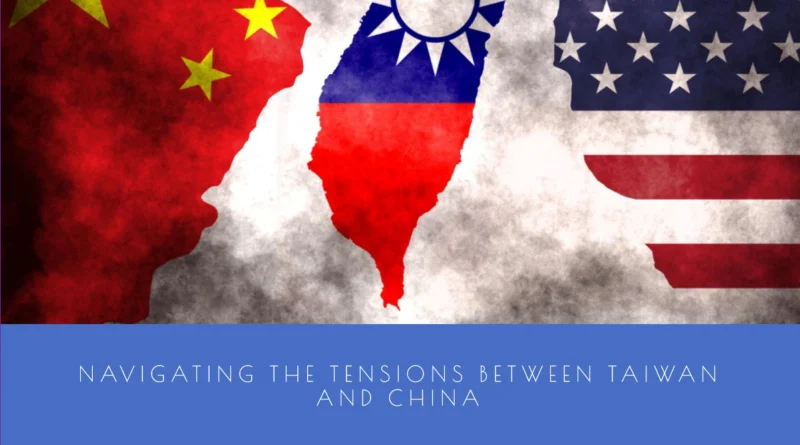The Complex Geopolitics of Taiwan and China: Is a war possible?
Introduction:
The relationship between Taiwan and China has long been a subject of international interest and concern. Situated in East Asia, these two entities have a history marked by political, military, and diplomatic tensions. While there isn’t an active war between Taiwan and China at the moment, the situation remains precarious, with significant global implications. In this comprehensive exploration, we delve into the historical background, contemporary dynamics, and the potential for conflict between Taiwan and China.
| Parameter | Taiwan | China |
| Official Name | Republic of China (ROC) | People’s Republic of China (PRC) |
| Capital | Taipei | Beijing |
| Political System | Democratic | One-party communist state |
| Area | 35,808 square kilometers | 9,596,961 square kilometers |
| Population | Approximately 23.6 million | Approximately 1.4 billion |
| Official Language | Mandarin Chinese, Taiwanese Hokkien, Hakka, indigenous languages | Mandarin Chinese |
| Currency | New Taiwan Dollar (TWD) | Renminbi (CNY) |
Historical Background:
To understand the complexities of Taiwan-China relations, it’s crucial to delve into their historical context:
- Chinese Civil War (1927-1950): The Chinese Civil War was a conflict between the Chinese Nationalist Party (Kuomintang or KMT), led by Chiang Kai-shek, and the Chinese Communist Party (CCP), led by Mao Zedong. The war resulted in the KMT retreating to Taiwan in 1949 after losing the mainland to the CCP.
- Taiwan as the Republic of China: Following the KMT’s retreat, Taiwan continued to function as the Republic of China, with its own government, military, and constitution. It was recognized by a significant number of countries as the legitimate government of China until the 1970s.
- Mainland China as the People’s Republic of China: The CCP established the People’s Republic of China on the mainland, claiming Taiwan as a province that needed to be reunited with the rest of China.
- Cold War Dynamics: During the Cold War, Taiwan was a crucial ally of the United States, further complicating the situation. The U.S. supported Taiwan both militarily and diplomatically.
Contemporary Dynamics:
Fast forward to the present, and Taiwan-China relations remain complex:
- Military Tensions: While there is no ongoing war, military tensions have flared up in the Taiwan Strait. China has not ruled out the use of force to achieve reunification, and Taiwan has been investing in its defense capabilities.
- Diplomatic Recognition: Taiwan is recognized as a sovereign state by only a few countries, with most nations recognizing the People’s Republic of China. The “One-China Policy” is a diplomatic principle that asserts there is only one China, and both Taiwan and mainland China are part of it.
- Global Concern: The situation in the Taiwan Strait is a matter of global concern. Any escalation in the region could have significant consequences, potentially drawing major powers like the United States into the conflict.
- U.S. Involvement: The United States has expressed support for Taiwan’s security and maintains unofficial relations with Taiwan. The U.S. Congress passed the Taiwan Relations Act, which commits the U.S. to provide Taiwan with defensive weapons.
| Country | Stance on Taiwan |
| United States | Supports Taiwan militarily and diplomatically; maintains unofficial relations |
| China | Claims Taiwan as an integral part of its territory; opposes any move towards independence |
| Russia | Generally supports China’s position on Taiwan |
| Japan | Officially recognizes the People’s Republic of China but maintains unofficial relations with Taiwan |
| European Union | Adheres to the One-China Policy, recognizing the People’s Republic of China |
| India | Has maintained unofficial relations with Taiwan while officially recognizing the One-China Policy |
| ASEAN (Association of Southeast Asian Nations) | Varies by member states, but most adhere to the One-China Policy |
Ongoing Developments:
Recent reports suggest that India is studying its options in case of a China-Taiwan conflict, indicating the global implications of the issue. This highlights the significance of Taiwan-China relations in shaping the geopolitics of East Asia.
Potential for Conflict:
The potential for conflict between Taiwan and China is a matter of concern for several reasons:
- Sovereignty Dispute: China views Taiwan as a renegade province that must be reunified with the mainland. Taiwan, on the other hand, considers itself a sovereign state.
- Military Buildup: Both Taiwan and China have been investing heavily in their military capabilities, with China’s military modernization being of particular concern to neighboring countries and the U.S.
- Divergent Political Systems: Taiwan’s democratic political system contrasts sharply with China’s one-party communist state, further complicating prospects for reconciliation.
- Global Implications: Any conflict in the Taiwan Strait would have significant global ramifications. It could potentially draw in major powers and disrupt regional stability.
Conclusion:
While there is no active war between Taiwan and China, the situation remains tense and complex. The historical background, contemporary dynamics, and global reactions underscore the significance of this issue in shaping the geopolitics of East Asia. The potential for conflict in the Taiwan Strait is a matter of global concern, and its resolution remains one of the most challenging diplomatic and security issues of our time.




